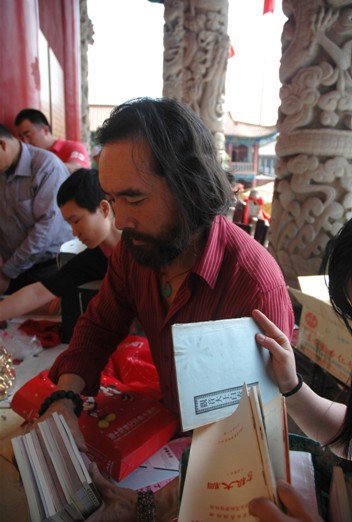
“Mahamudra: Essence and Practice” ( Book II)
What Savour Is the Nature of Emptiness?
◎Chen Yixin: If one sees the Yidam during his practice of the creation stages, can it be said that he has seen his own nature? Could you talk about the perception of the nature of emptiness?
●Xue Mo: Seeing the Yidam doesn’t mean that the person has experienced enlightenment. Nothing can do without mind-nature. There is nothing special about seeing the Yidam, for it has an opposite. About this, Padmasambhava had specific instructions in his Dakini Teaching.
Except seeing the Yidam in the strictly religous sense, an insane person sometimes sees some shadows too. Psychology tells us there are two I’s. There is a band in the brain, connecting the left and right cerebral hemispheres. It is called the corpus callosum. A person with a dissociated personality has something wrong with the corpus callosum, which creates two different voices in his brain. Sometimes, the left brain wants to kill but the right brain thinks killing is wrong. Then we can see that person holding a knife in one hand and the other hand holding the hand holding the knife. When some patients go to the toilet, their left brain commands one hand to undo his fly, while the right brain, which doesn’t think it right, commands the other hand to do up his fly. In the end, he wets his pants.
The illusions of some of the practitioners are like that. They may have created another self, but that self is still within the mind-nature. “All phenomena are like a dream, an illusion, a bubble and a shadow, like dew and lightning. Thus should you meditate upon them.” Buddhist practice aims at escaping suffering and attaining happiness. Many phenomena are actually psychological phenomena. What you see after you have achieved the brightness of emptiness is real and unchanging brightness. If you say it’s false, it’s not false; if you say it’s real, it’s still an illusory transformation. If you are convinced that what you see is real, you commit the error of eternalism. If you are convinced that what you see is false, you commit the error of nihilism. As Niguma said to Khyungpo Naljor, transmigration is illusory transformation and so is nirvana. There is no need to bother about whether it is real or false? In general, you should not be obsessed with it, whether it is real or not.
As for the perception of emptiness, it’s hard to describe it. It is like savoring tea – you cannot say clearly how it tastes.
Only when you have achieved it can you know its perception. As the saying goes, only the fish that drinks the water knows whether it is cold or warm. Quite a few practitioners mistake only emptiness for the nature of emptiness. Only emptiness is like a stone soaked in cold water – a deep meditation for thousands of years will get you nowhere.
Of course, when you seek confirmation from your guru, you have to manage with some effort to tell him what emptiness is like. When I went to my guru for confirmation, I, like a dumb person tasting delicious food, could not clearly express my perception. Even so, a guru endowed with all virtues could see your state. After I tried to describe some of my perceptions, my guru burst into laughter and said, “You see, even a first-rate writer isn’t able to describe that state properly. Tell you what, that’s the Bright Mahamudra.” One of my dharma brothers was present at that time. She told me some time later that our guru was very pleased that day and that he had never laughed like that before. Thanks to the convenience of interviewing equipment, all the valuable recordings have been kept.
You know, the nature of emptiness, which is a right view (samyagdrsti), cannot take the place of bodhicitta. Having the nature of emptiness doesn’t mean you necessarily have bodhicitta. The three fundamental elements of Buddhist practice are a supra-mundane mind, bodhicitta, and samyagdrsti.
◎Chen Yixin: Is it that a supra-mundane mind is very important?
●Xue Mo: No supra-mundane mind, no chance of complete enlightenment. Especially for those who have experienced enlightenment, without a period of time set aside specially for retreat, their state of enlightenment won’t improve. But for those whose state of enlightenment has been consolidated, retreat is not necessary, because they are in samadhi at any moment and nothing can affect their state of enlightenment. When the state of Mahamudra permeates every incident of your daily life – eating, putting on clothes, walking, sleeping, reading, writing, etc. – it no longer matters whether you renounce the secular world or not.
Notice
Translated by non-professional volunteers, there would be some inaccuracies in the translation. You are welcome to offer us some advice for emendation. Please feel free to contact us.We also look forward to you joining our voluntary translation team.
Please contact us at suonanzhuoma1988@163.com, thank you.
《光明大手印:实修心髓》下
空性是什么滋味?
◎陈亦新:修生起次第能够见到本尊算不算见性?能否讲讲空性的觉受?
●雪漠:见到本尊不算开悟。一切不离心性。即使真见到本尊也没有什么,以有相对故。对此,莲花生大士在《空行教授》中有明确的开示。
除了真正的宗教学意义上的见到本尊之外,精神病患者也会看到一些影子.心理学上说人有两个“我”,大脑中有一个胼胝体,左右大脑中间有一个隔膜。人格分裂者的胼胝体出了问题,大脑中就会出现两个声音,有时左脑想杀人,右脑认为杀人是不对的,于是就一个手拿刀,另一个手却拽着拿刀的手。还有的病人上厕所,左脑指挥手拉开拉链,右脑认为拉开不对,就指挥另一只手拉住它。就这样反复地拉来拉去,最后尿裤子。
一些修行人出现的幻觉就类似于此,行者修出了另外一个自己,还是不离心性的。一切有为法,如梦幻泡影,如露亦如电,应作如是观。佛教的目的是离苦得乐,很多现象实际是心理现象。证得空性光明后之所见为实相光明,说假也不假,说真犹属幻化。若将此时之所见执为真实则为常见,执为虚假则为断见。正如奶格玛对琼波大圣所开示的:轮回是幻化,涅槃亦是幻化,你何必管他是真是假?一般来说,不管是真是假都不要执著。
至于空性的觉受,不好说。就像品茶,说出就不对了。你只有证到那个东西,你才明白它是什么觉受,所谓“如鱼饮水,冷暖自知”。有好些人将顽空当成了空性,错了。顽空是冷水泡石头,纵然一定万年,也生不起大用的。
当然,你叫上师印证时,还是得勉强能说出那种味道。我叫上师印证时,如哑尝味,虽知百味而口不能尽言。但具德上师还是能明白你那境界的。我勉强说了一些觉受。上师哈哈大笑,说,瞧,多好的作家也说不出那种境界吧?那就是光明大手印。那天,还有师兄在场,后来她说那天上师非常高兴,他从来没有那样大笑过。因为采访的方便,这些珍贵的录音都保留了下来。
要知道,空性不能代替菩提心,空性是一种正见。有了空性不一定有菩提心。出离心、菩提心和正见三者为修行根本。
◎陈亦新:您是不是对出离心看得很重要?
●雪漠:没有出离心,就不可能生起证悟。尤其在开悟之后,没有相对安静至少类似于闭关的出离专修,你的悟境是不会增长的。但你的悟境坚固之后就不要紧了。因为你无时不在定中,你无时不在那种境界中。当你的衣食住行、读书写作,无时无刻不在大手印中时,便无所谓出离不出离了。
声明:本文系文化志愿者试译,非专业人才翻译,错误定然不少,如出现疏漏及错误,敬请读者见谅。如有任何翻译上的建议及修正意见,欢迎及时与我们取得联系,我们会加以校对、修改,并希望有专业才能的朋友也能加入我们志愿者群体中来。
邮箱地址:suonanzhuoma1988@163.com
